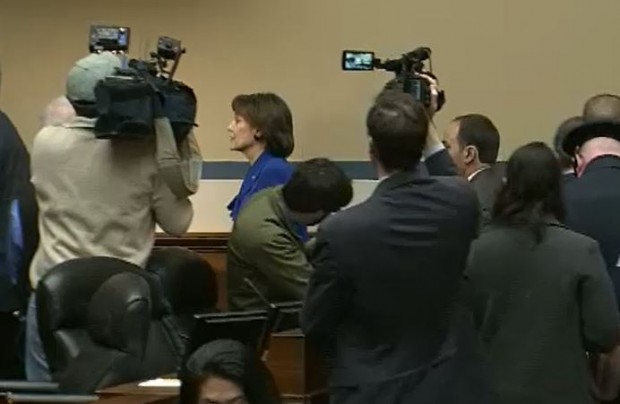Insufficient IRS explanations cause Judge to order sworn answers from IRS about Lois Lerner’s hard drive and emails.
Judicial Watch has sued over missing IRS emails in the federal district court in D.C., pursuant to its FOIA request for such documents.
The IRS was ordered to provide explanations as to missing emails, particularly Lois Lerner.
The IRS provided explanations, but those were not good enough for the Judge, who launched his own inquiry into the matter, as Judicial Watch explained in a statement posted
on its website:
Judicial Watch President Tom Fitton made the following statement in response to
today’s order from Judge Emmet G. Sullivan regarding the recently “lost” emails of Lois Lerner and other IRS officials, which were the subject of longstanding Judicial Watch Freedom of Information Act (FOIA) requests and lawsuit (
Judicial Watch v. IRS(No. 1:13-cv-1559)):
In an extraordinary step, U. S. District Court Judge Emmett Sullivan has launched an independent inquiry into the issue of the missing emails associated with former IRS official Lois Lerner.
Previously, Judge Sullivan ordered the IRS to produce sworn declarations about the IRS email issue by August 11. Today’s order confirms Judicial Watch’s read of this week’s IRS’ filings that treated as a joke Judge Sullivan’s order.
Judge Sullivan, in his earlier ruling, appointed Magistrate Judge John M. Facciola to manage and assist in discussions between Judicial Watch and the IRS about how to obtain any missing records from other sources. Magistrate Facciola is an expert in e-discovery, and authorized Judicial Watch to submit a request for limited discovery into the missing IRS records after September 10.
Here is the Judge’s Order (emphasis added, hard paragraph breaks inserted for ease of reading):
MINUTE ORDER. In light of [26] the Declarations filed by the IRS, the IRS is hereby ORDERED to file a sworn Declaration, by an official with the authority to speak under oath for the Agency, by no later than August 22, 2014.
In this Declaration, the IRS must:
(1) provide information about its efforts, if any, to recover missing Lois Lerner emails from alternate sources (i.e., Blackberry, iPhone, iPad);
(2) provide additional information explaining the IRS’s policy of tracking inventory through use of bar code property tags, including whether component parts, such as hard drives, receive a bar code tag when serviced. If individual components do not receive a bar code tag, provide information on how the IRS tracks component parts, such as hard drives, when being serviced;
(3) provide information about the IRS’s policy to degauss hard drives, including whether the IRS records whose hard drive is degaussed, either by tracking the employee’s name or the particular machine with which the hard drive was associated; and
(4) provide information about the outside vendor who can verify the IRS’s destruction policies concerning hard drives.
Signed by Judge Emmet G. Sullivan on August 14, 2014. (lcegs4)

0






No comments:
Post a Comment